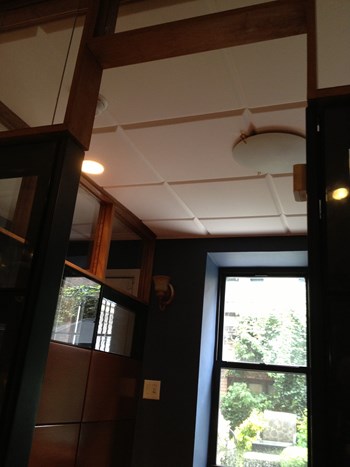
In
New York City, you deal with noise everywhere you go: the subway
screeches while pulling into the station; city buses beep every time
they make a stop; and millions of people pound the pavement and
chat on their phones as they fill the air with cacophony.
So your home should feel a bit like a respite--a sanctuary space away from the noise pollution. But oftentimes, it doesn’t.
“We get calls for ‘I can hear kids running above me’ or ‘We lived in this condo/co-op for years, never heard anything--and now a new family is there and kids are running all over the place.’ These people are in for a shock because they’ve been living in peace and harmony, and all of a sudden their world’s been turned upside down,” says Michael LaFratta of Silentium Soundproofing in New York City.
Almost every New Yorker shares at least one wall with another resident, and most of us share all the walls and the ceiling and floor, too. Noise travels through these barriers, which is where soundproofing comes in for buildings.
“We do a lot of new buildings because often the builders don’t consider soundproofing systems,” says Mason Wyatt, owner of City Soundproofing in Manhattan.
And LaFratta says noise can also be an issue in pre-war buildings. “I’ve been in older buildings where you hear everything,” he said.
Elaborate Soundproofing Techniques
There are various things you can do to soundproof your apartment, from “decoupling” the ceiling (breaking the connection of your ceiling to the floor above ), to adding extra layers of drywall to your walls.
Wyatt recommends “isolating” the ceiling from the floor above. At City Soundproofing, they use special clips with rubber fittings that reduce the connectivity between them. “In the case of the ceiling, the lower part is isolated from the direct structure point that’s above it,” he says.
LaFratta recommends another process to decouple by using spring hangers that essentially hang your ceiling from the floor above. That can cost upwards of $25,000 for a 200-square-foot room, he says. Costs include all labor, painting, demo and rebuilding.
“There’s a science to doing a ceiling, that’s why it’s so expensive,” says LaFratta.
As for walls, Wyatt applies an acoustic barrier (i.e,, mass loaded vinyl) to the existing wall surface, then uses a stud system to attach a new drywall to the existing wall. It’s connected at the floor and ceiling so that there is “isolation,” meaning nothing to transmit noise or vibrations from the existing wall to the new wall.
For a standard-sized bedroom wall, the price could be $5,000-$6,000, says Wyatt. “As you well know, people are paying $1,200 a square foot; and if they can’t sleep, their neighbors are driving them crazy, what’s $6,000 when looking at a million-dollar investment?”
Or the Less Elaborate Options
If you don’t want to spend the money or bear the construction headaches, there are other ways to soundproof.
Wyatt says you can add multiple layers of drywall and damping compound (a viscous material that absorbs sound) directly onto a wall. But while you’ll spend half as much, you’ll only get about 25 percent of the reduction in noise.
Another option is to add noise-absorbing tiles to your ceilings or acoustical panels to your walls. Wyatt recommends Melamine ceiling tiles, which will cost “substantially less.”
“Anytime you add absorptive materials, overstuffed chairs...tapestries, moving blankets, those kind of things are soft and acoustically absorbent, it will help to reduce the echo in a room,” he says. “That makes it more comfortable because ... it lowers the volume in the room.”
While tiles and panels diminish room acoustics, they don’t lessen the amount of noise that enters an apartment from another by very much, says LaFratta, whose company also installs them. “What it does is bring down the echo from bouncing all over the place. It helps a little bit … but it will still be annoying.”
In the end though, soundproofing your apartment to any extent will be worth it financially.
“Sound’s
a major issues in the New York City metropolitan area, absolutely,”
says LaFratta.
Georgia Kral is a staff writer at The Cooperator.






Leave a Comment